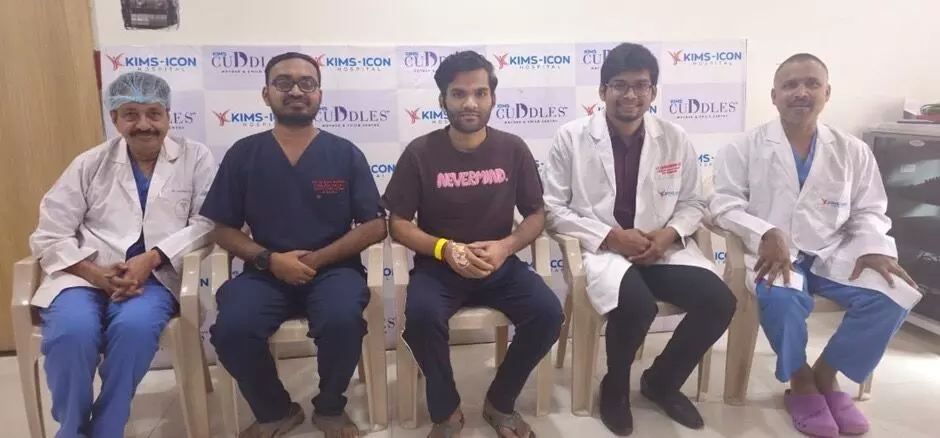KIMS ICON team transports critical patient 500 km on ECMO support from Bhubaneswar to Vizag
Apart from one short stop for blood tests, the team never halted the ambulance during the entire journey
By Newsmeter Network
Visakhapatnam: A young engineer from Bhubaneswar, Odisha, suddenly faced multi-organ failure and was transported over 500 km by road to Visakhapatnam for critical care. The 25-year-old patient was kept alive through a portable ECMO (Extracorporeal Membrane Oxygenation) machine during the journey.
The critical journey was managed by the team of doctors led by Dr M Ravikrishna from KIMS ICON Hospital in Visakhapatnam. The doctors in Bhubaneswar contacted KIMS, which dispatched the team to bring the patient to the hospital in Vizag.
Investigation revealed multiple issues in lungs, heart and brain
Apart from one short stop for blood tests, the team never halted the ambulance during the entire journey.
When the patient reached KIMS ICON, investigations revealed lung injury, cardiogenic shock, brain haemorrhage and liver and kidney failure.
“Transporting such a critically ill patient over such a long distance was extremely challenging,” said Dr Ravikrishna. “Putting him on ECMO early was the turning point — it prevented further organ damage.”
At Visakhapatnam, advanced treatment began immediately. The team administered inhaled nitric oxide to improve oxygenation without affecting the brain. Simultaneously, they treated to prevent further brain bleeding. Within a few days, the patient began to recover rapidly, and within five days, all support systems, including ECMO, were removed. He was out of danger.
A rare, life-threatening tumour of adrenal gland detected
After stabilisation, detailed evaluations were conducted. Doctors learned that the patient had been experiencing episodes of anxiety and excessive sweating for the past two years. Further tests revealed Pheochromocytoma (PMC) — a rare, life-threatening tumour of the adrenal gland that causes uncontrolled secretion of adrenaline. Because the hormone surges occurred only intermittently, previous tests had shown negative results, despite his symptoms being severe at times.
After nine days of intensive care, the patient was discharged. He was then evaluated by Dr Lakshminarayana (Surgical Oncologist) and Dr Shravanthi (Endocrinologist).
Four weeks later, a laparoscopic surgery was performed to remove the tumour under the supervision of senior anaesthetists Dr Somaraju and Dr Appalaraju. Tests confirmed that it was an early-stage cancer, which had not spread elsewhere.
“This case shows how rare endocrine emergencies can sometimes cause unexplained multi-organ failure,” said Dr Ravikrishna. “It takes great skill to use ECMO in such conditions. We had to think like medical detectives — the rapid recovery after ECMO, and the way some drugs were ineffective, made us suspect an endocrine cause rather than sepsis. Once we treated accordingly, the patient recovered fully.”
He added that the success of this 500 km ECMO transport and the patient’s recovery were possible only due to teamwork, timely intervention and advanced technology.